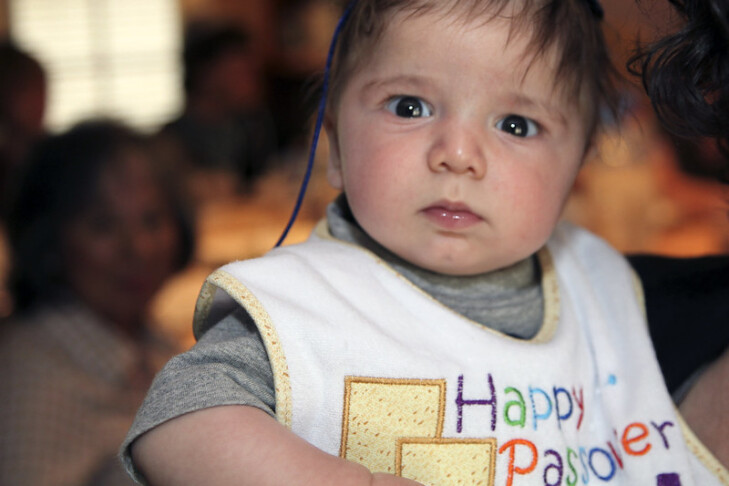I will host all ages for Passover: A 6-year-old, a 12-year-old, a few middle-aged people and a 70-something. While the adults are pretty much covered with chopped liver from Clover Food Lab (love their boxes) and wine, kids are trickier. If you find yourself in the same boat, here are some creative ways to make Passover accessible for everyone.
For preschoolers: Lighten the mood
Make the Haggadah relatable, and bring the (extra) drama to keep things engaging. “Make space for good stories. That’s what ‘Haggadah’ means. It’s about telling a story. For example, it’s about telling a version of the Exodus story, but you can also tell a family story, and make it fun and funny,” Rabbi Tamara Cohen told me when I interviewed her about Passover activities during the height of COVID isolation. For instance: Sing. Enact the plagues with props. Keep things speedy and light—and be sure to check out PJ Library’s ultra-accessible family Haggadah and our activity pages for squirmy kids.
And, while a seder plate might not contain delicacies fit for a preschool palate, it’s fun to create your own. Kveller has tons of ideas for Passover crafts, from a DIY plate to an afikomen bag decorated with markers and stickers (please no glitter) to cardboard matzo. If you’re feeling very ambitious, create your own matzo house. If you’re not the crafty kind, grab a seder-themed bingo board with matzo-shaped chips. It’s fun for even the littlest kids (and a perfect housewarming gift if your child is a guest elsewhere!).
For elementary schoolers: Bring your kids into the kitchen
While I don’t plan to have my children whipping up gefilte fish any time soon, I’ll let them make some food from Joan Nathan’s “King Solomon’s Table,” which is full of kid-friendly recipes, like biscuits and chocolate sausage. (Or check out these tasty recipes from your friends at JewishBoston!)
“Let My Children Cook!” is another fun one with recipes I’m fairly sure you won’t find anywhere else, like strawberry “snow” and matzo marshmallow melts. I’ve also used the recipe archive from PJ Library—matzo pizza is a big favorite. The point is to give them a little bit of ownership over the proceedings. In the past, I’ve turned it into a “MasterChef”-style competition wherein I interview each amateur contestant (as in, my kids) before they enter the test kitchen and conduct a thorough tasting afterward, complete with a debriefing video. You gotta do what you gotta do.
For tweens: Rock out
My sixth-grade son is freshly obsessed with TikTok, for better or worse. Social media is his love language. And so I’ve discovered a few fun Passover follows, on his level: challah maven and “Jew-ish” cookbook author Jake Cohen. Hilarious and relatable, he’s known as the “Modern Mensch.”
To get into the spirit with music, check out the Miami Boys Choir. This group specializes in Jewish Orthodox pop and has been around since 1977, yet somehow recently went incredibly viral with their infectious harmonizing. It’s a perfect cooking or table-setting soundtrack.
To kick off the meal, crank up “Hamilton Rap: The Passover Story” by Zak Sandler, with a nod to Lin-Manuel Miranda, to put proper history into rhythmic perspective. Then segue into some tunes by the Maccabeats, beloved for their humorous Jewish a cappella. One favorite: “The Justin Bieber Passover Mashup.”
For older teens: Incorporate current events
During peak COVID, it wasn’t a stretch to tie ancient plagues to current ones, and teens definitely respond to stories of resilience and hope.
“A remarkable fact is that Jews have done seders through many difficult times. Sure, this is unprecedented, but it’s also unprecedented that we can connect with our families, as opposed to being isolated,” Cohen says. There are plenty of stories of previous generations celebrating Passover in horrible circumstances, even in concentration camps,” she added.
“Tell those stories, because it describes our resilience,” Cohen told me at the time.
This still rings true, even in our (somewhat?) back-to-normal world. Teenagers also want to feel like active participants who can understand Passover’s implications on a more nuanced level. To spark conversation, think of questions beyond the classic four: How can one person make meaningful change in the world? What does resilience mean to you? How do you define freedom? What types of oppression worry you in today’s climate? How will you fight back against that oppression?
For even more conversation prompts, check out “More Than Four Questions: Supplements for Your Seder,” with topical, themed ideas. Good luck!



